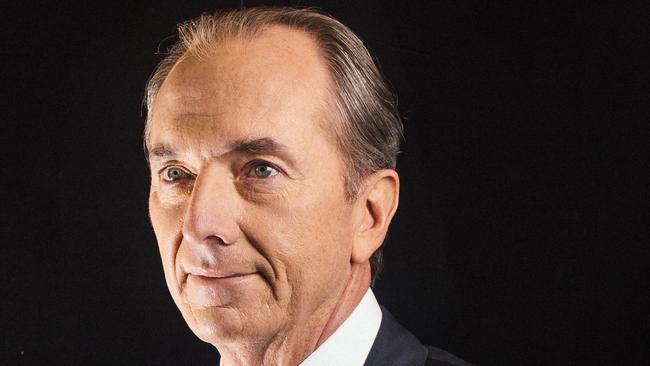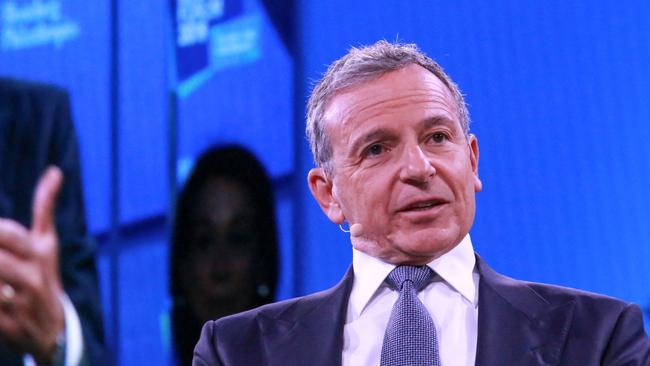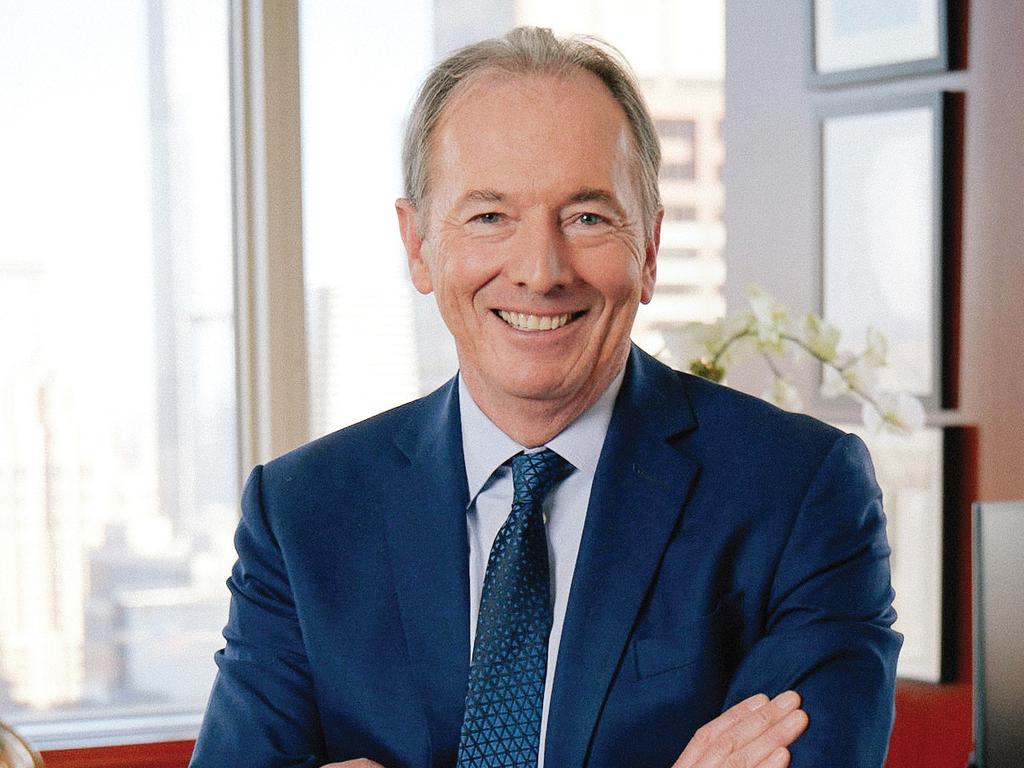Former Morgan Stanley boss James Gorman will take charge as chairman of media major Disney


A banker from the suburbs of Melbourne has been given the responsibility of steering Disney through one of the toughest succession dramas in corporate America.
Former Morgan Stanley boss James Gorman will take charge as chairman of media major Disney next year and his first job will be to find a replacement for two-time chief executive Bob Iger.
For the 73-year-old Disney CEO, hanging up his career has been the hardest thing to do.
In late 2022 he was famously lured out of retirement back to the role he held for years after his anointed successor, Bob Chapek, quickly fizzled out.
Costs were spiralling and Disney was losing its sparkle – as well as billions of dollars – in the streaming wars. Iger was recalled for another four years to right the media major as well as find another successor.

During his first time running Disney, Iger delayed his retirement as many as four times and stayed on as CEO for 15 years.
Investors had become hooked on Iger who, during his time had made a series of company changing acquisitions including Pixar, 21st Century Fox as well as Lucas Film that delivered the Star Wars franchise to the magic kingdom.
Gorman faces the weight of history too. Disney itself has a history of troubled succession planning; even Iger’s own appointment came about as a result of a boardroom battle that ultimately pushed out former chief executive Michael Eisner – in part for failing to develop a clear succession path.
Iger’s second time running Disney hasn’t been met with the same sharemarket success as the first stint however, as it has also coincided with serious disruption from broadcast and streaming media.
Iger was among the first to pull back on spending as the streaming content wars were nearing their peak.
He too sought profit over reach for streaming, including leading the way with a series of price rises. He also questioned the business model that set up a platform where consumers could binge on unlimited content then disappear. It was unsurprising that customer churn rates were pushing so high.
After two years of slashing costs and repositioning the streaming platform, in the June quarter the Disney+ streaming business posted a small but symbolic profit.
All eyes will be on the next quarterly update in November.
So why pick James Gorman?
The Morgan Stanley boss delivered a textbook succession when he retired from his former bank last year.
Gorman had been in the role for 14 years and had rebuilt the Wall Street bank from a lender which was reeling from crisis during the GFC to a safer, confident bank of scale.
The obsessive Collingwood fan left Melbourne in the 1980s to make it in New York and quickly found his way in banking.
Gorman grew up in Glen Iris and studied law at Melbourne University. He recalled, during a speech last year, how he financed a career change by borrowing $40,000 at an interest rate of 24 per cent to study business at Columbia University in New York.
“Back then I became acutely aware of the central role that banks played. In very simple language they matched people who had money with people that needed it,” he said.
As well as an obsession with risk management, at Morgan Stanley Gorman was renowned for his focus on building long-term returns.

It was a major test when Morgan Stanley handed the job over to Gorman’s internal successor, Ted Pick, but investors barely blinked.
In a further boost, Morgan Stanley shares are up 25 per cent this year, although the lower interest rate environment is helping.
Gorman was appointed to the Disney board earlier this year and even at the time was expected to quickly take charge as chairman.
He replaces Mark Parker, who is also chairman of Nike. It was Parker who oversaw the transition from Iger to Chapek and then back to Iger
On joining the board, Gorman led the board committee tasked with finding a new CEO; this was a signal that Disney was determined to get succession right.
In the appointment Disney has put a signal to the market that Iger will retire once and for all in 2026. This gives Gorman a long runway to search and test candidates. After a career on Wall Street, Gorman will be well aware that the one thing a chairman does that really matters is hiring the right CEO.
In a speech in Melbourne last year Gorman said a board has two jobs. The first is managing the CEO and the second job is overseeing everything else.
The first is much, much more important than “the everything else”, he said in the speech.
Indeed Gorman who has limited experience in media will be tasked with overseeing and potentially reining in an incredibly powerful chief executive – albeit one who is at the end of his career.
The key for Iger’s successor will be how Disney plans to keep growing the audience on its platforms in the face of further disruption. And although AI is in its relative infancy, the technology has the potential to fundamentally change the entertainment business model in the years to come.
For studios, this represents the ability to cut costs, but it also offers far more choice for consumers.
So too Disney needs to work how all of its content arms from movies, cable platforms such as ESPN, and television and streaming fit together.
Now it’s all up to Gorman to write the sequel.
–
Accountability AGMs
Shareholders are becoming more strategic around how they make their concerns known this annual meeting season.
Last year represented the high-water mark in the number of shareholder protests with names like Qantas, Magellan and ASX feeling the heat. However, this year’s AGM season is shaping up as an exercise in accountability voting.
The anger hasn’t gone away toward fund manager Perpetual. Last week it copped a comprehensive rejection of its strategy, and the board was hit with an 88 per cent vote against the remuneration report. For context, last year’s Qantas vote was 83 per cent.
Shareholders have lost trust with the Perpetual board after years of poor performance and an overpriced acquisition that led to a break-up and uncertain future as a fund manager.
Elsewhere, Treasury Wines’ John Mullen received an uncomfortably high vote against his re-election for holding too many chair positions (Qantas and Brambles) as well as private company roles.
Brambles’ AGM is scheduled for Thursday and Qantas on Friday. Votes are now following directors, not just companies.

There is clearly still simmering anger with ASX’s technology disaster and landmark ASIC legal action against the company. ASX director Melinda Conrad felt the heat this week when she had a hefty 28 per cent no vote against her re-election at property play Stockland.
Conrad has been an ASX director since 2016 and therefore was part of the team that has led the exchange operator through the biggest reputational hit since it listed in the late 1990s. Other Stockland proposals put to shareholders breezed through, including the remuneration report.
Attention now will turn to another ASX director, Heather Smith, who is up for re-election at Challenger on Thursday. Still, Smith was only appointed to the ASX board in mid 2022 so this limits her exposure to the tech problems.
AGMs to watch in coming weeks include WiseTech Global, ASX and even banking major ANZ, given its recent tangle with regulators.
Based on the trend of votes coming in from the big offshore pension funds, Qantas should avoid a second strike and that means not having to undergo a board spill.
Magellan has also found support under a new chairman and chief executive after nearly two years of pain.
Coming full circle is Suncorp. The insurer is now firmly a shareholder favourite after selling its bank to ANZ.
A plan to return the bulk of the funds from the $4.9bn sale to shareholders faced zero resistance. The Suncorp remuneration report had just a 1.5 per cent vote against it. In AGM parlance that’s a rounding error.
eric.johnston@news.com.au




